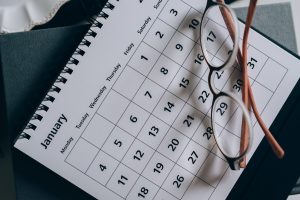Spanish Level 1- Activities Designed for Online Instruction
📆 Spanish Level 1, Activity 05: Días de la Semana / Day of the Week (Online)

World-Readiness Standards:
- Standard 1.1 Students engage in conversations, provide and obtain information, express feelings and emotions, and exchange opinions.
- Standard 1.2 Students understand and interpret spoken and written Spanish on a variety of topics.
- Standard 1.3 Students present information, concepts, and ideas in Spanish to an audience of listeners or readers on a variety of topics.
Idaho Content Standards for World Languages:
- COMM 1.1 – Interact and negotiate meaning (spoken, signed, written conversation) to share information, reactions, feelings, and opinions
- COMM 2.1 – Understand, interpret, and analyze what is heard, read, or viewed on a variety of topics.
NCSSFL-ACTFL Can-Do Statements:
- I can talk about my weekly routine
- I can talk about what I learn and do
- I can talk about school subjects
- I can compare and contrast differences between a calendar in the United States and in Spanish-speaking countries (Intercultural)
Materials Needed:
Warm Up
Materials Needed for the Warm Up
- Open the Google slideshow and go over the Can-Do Statements.
Aquí están los “can do statements.” Son para guiar nuestro lab. - (Use the present mode in Google Slides!)
Ask students to write in the chat the correct order of the days of the week in the US.
Hoy vamos a practicar los días de la semana. Escriban en el chat los días en orden como es en el calendario americano. - Ask students to write in the chat the correct order of the days of the week in some Spanish-speaking countries.
Escriban en el chat los días en orden como es en el calendario en países hispanohablantes. - On the slide show, show the comparison between the calendars
En los Estados Unidos, la semana empieza con domingo, pero en países hispanohablantes, la semana empieza con lunes. - Starting on Slide 8, practice going over with the students how to communicate which days students do which activities. For each question, ask a student what they do on that day. Give students an example.
Para la siguiente actividad, vamos a hablar sobre el horario semanal.– Por ejemplo, “¿Qué días estudias?” Yo estudio los lunes, martes, y jueves”
Main Activity
Materials Needed for the Main Activity
- The next section will be a review of academic subjects. There are two images, each representing a different academic subject, on each slide. The facilitator will choose one of the two subjects to describe, and the students will try to determine which of the two subjects the instructor is describing.
Voy a describir un tema académico. Necesitan adivinar cuál tema estoy describiendo. - In the notes of each slide, there’s a brief description of one of the images for you to read if you need an idea (Make sure you select presenter view, so the students can’t see the notes.)
Wrap up
- Ask the following wrap-up questions:
- ¿Cuál es tu materia/disciplina/tema favorita? (What is your favorite school subject?)
- ¿Cuál es una materia que a tí no te gusta? ¿Por qué? (What is a school subject that you don’t like? Why?)
- ¿Cuál o cuáles día(s) tienes muchas actividades? (What day(s) do you have lots of activities?)
End of Lab
- Read Can-Do statements once more and have students evaluate their confidence.
- (Use thumbs up/thumbs down or download our student cards.)
- Encourage students to be honest in their self-evaluation.
- Pay attention, and try to use feedback for future labs!
Can-Do Statements:
- I can talk about my weekly routine
- I can talk about what I learn and do
- I can talk about school subjects
- I can compare and contrast differences between a calendar in the United States and in Spanish-speaking countries (Intercultural)
Cultural Notes:
How to Revise or Remix a Pathways Project Activity
Feeling creative? The Pathways Project needs your help in revising and remixing activities for the K-16 language classroom.
Try taking an activity to the next level by:
- Add new content (something you’ve created or another OER source)
- Contribute additional activity suggestions
- Integrate authentic materials such as videos, infographics, photos, etc.
- Suggest how to implement the activity in the classroom
- Customize the content for a specific audience or group of learners (for example, K-5 learners or to differentiate for student’s needs)

